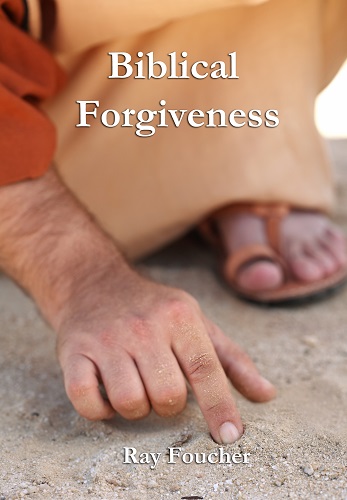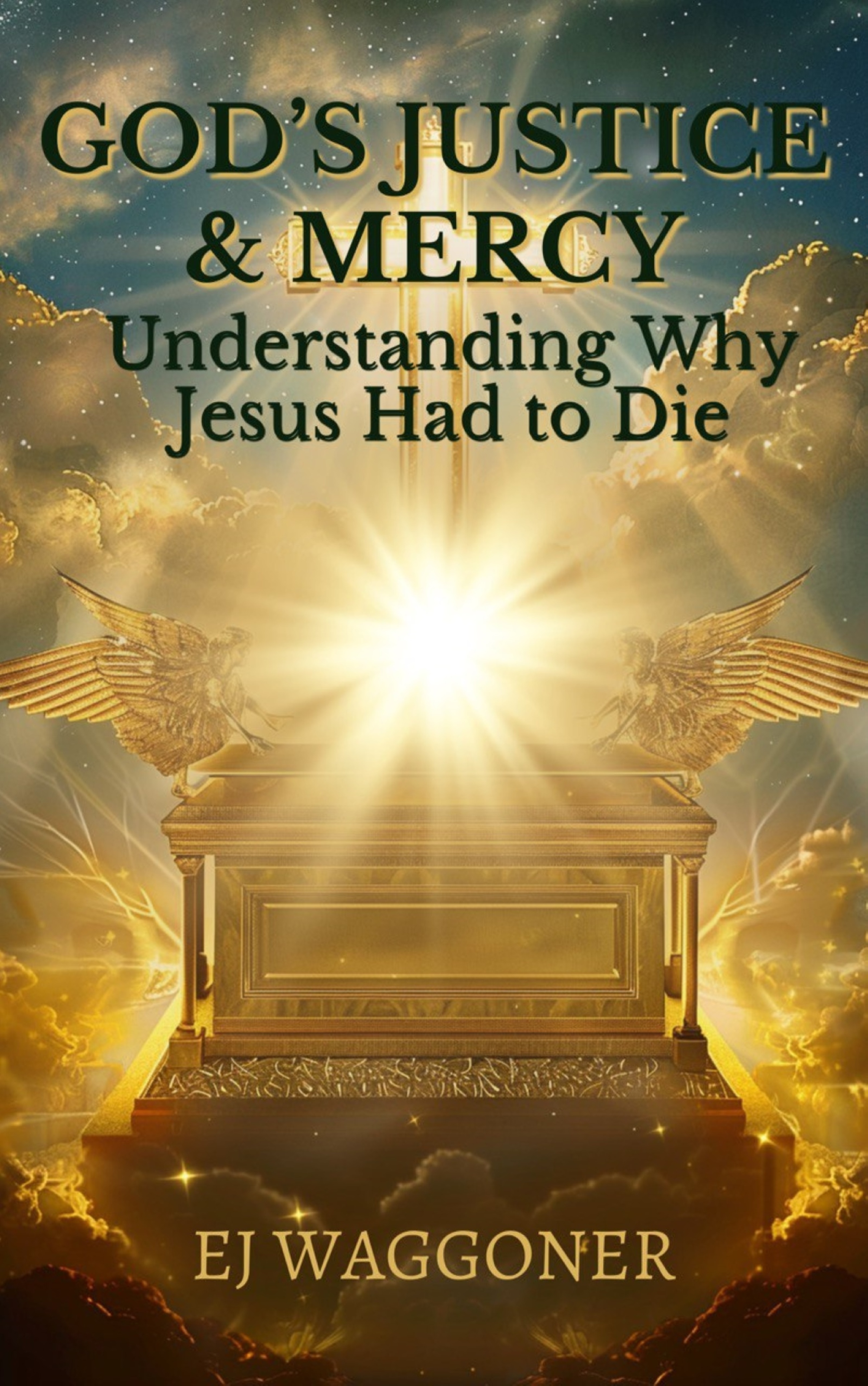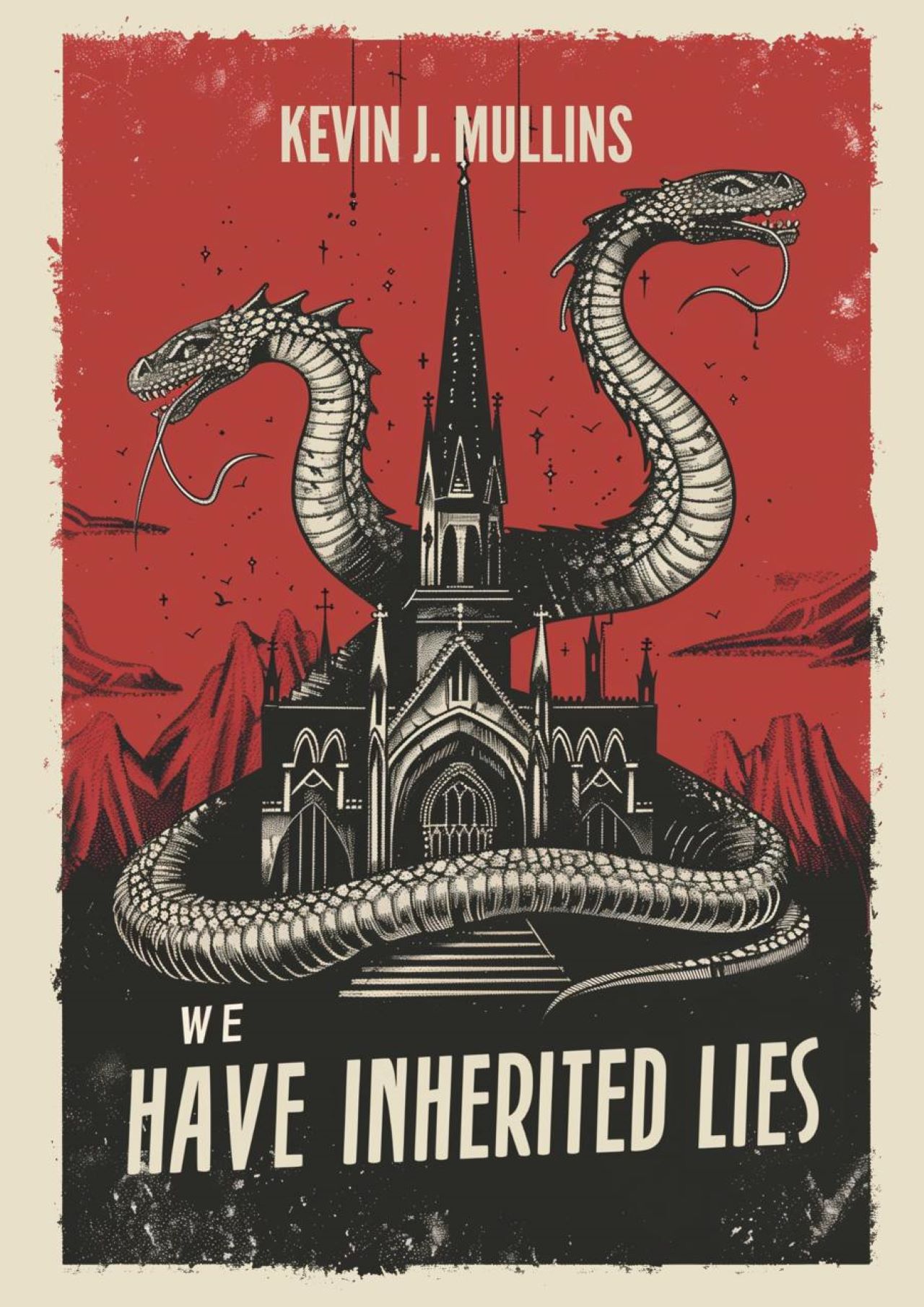(Revelation 1:10) What About “the Lord’s Day” and the Observance of Sunday by the Early Christian Church?
“I (John) was in the Spirit on the Lord's day, and heard behind me a great voice, as of a trumpet.” (Revelation 1:10)
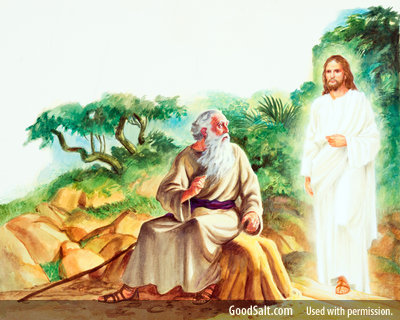 Many teachers say that John, who lived in the first century A.D., was referring to Sunday when he says “the Lord’s Day.” They come to this conclusion due to the fact that some early 2nd century A.D. “Christian” writers connect the term “Lord’s Day” with Sunday. Before we look at their writings, let’s look at what John said first.
Many teachers say that John, who lived in the first century A.D., was referring to Sunday when he says “the Lord’s Day.” They come to this conclusion due to the fact that some early 2nd century A.D. “Christian” writers connect the term “Lord’s Day” with Sunday. Before we look at their writings, let’s look at what John said first.
If John is referring to a weekly assembly by the term “the Lord’s day” then the only day he could be referring to is the seventh-day Sabbath. In Isaiah 58:13 God calls the Sabbath “My holy day.”
“If thou turn away thy foot from the Sabbath, from doing thy pleasure on My holy day; and call the Sabbath a delight, the holy of the LORD, honourable; and shalt honour Him, not doing thine own ways, nor finding thine own pleasure, nor speaking thine own words.”
Another interesting phrase found above is the phrase “the holy of the LORD.” Here it is again in the New International Version:
“If you keep your feet from breaking the Sabbath and from doing as you please on My holy day, if you call the Sabbath a delight and the LORD’s holy day honorable, and if you honor it by not going your own way and not doing as you please or speaking idle words.”
Right here we see that the Sabbath is “the LORD’S holy day” or as John said, “the Lord’s day.” Here it is again in the New Living Translation:
“Keep the Sabbath day holy. Don’t pursue your own interests on that day, but enjoy the Sabbath and speak of it with delight as the LORD’s holy day. Honor the Sabbath in everything you do on that day, and don’t follow your own desires or talk idly."
In Exodus 20:10 God says: “… the seventh day is the Sabbath of the LORD your God …” The Sabbath is the only day God proclaims as His holy day, therefore, the Sabbath is “the Lord’s day.” For a study on whether or not the disciples of Christ began to honor Sunday as a holy day during the first century see the article entitled, Didn’t the Disciples Observe Sunday as the New Sabbath?
The Second Century A.D.
At the time of the second century, just after the close of the book of Revelation, a Jewish revolt sprung up in the year 115 A.D. This revolt invaded Cyrene, Egypt and Cyprus and caused the deaths of more than 220,000 Greeks and Romans. After the Romans would cease each revolt they would tighten their hatred against the Jews.
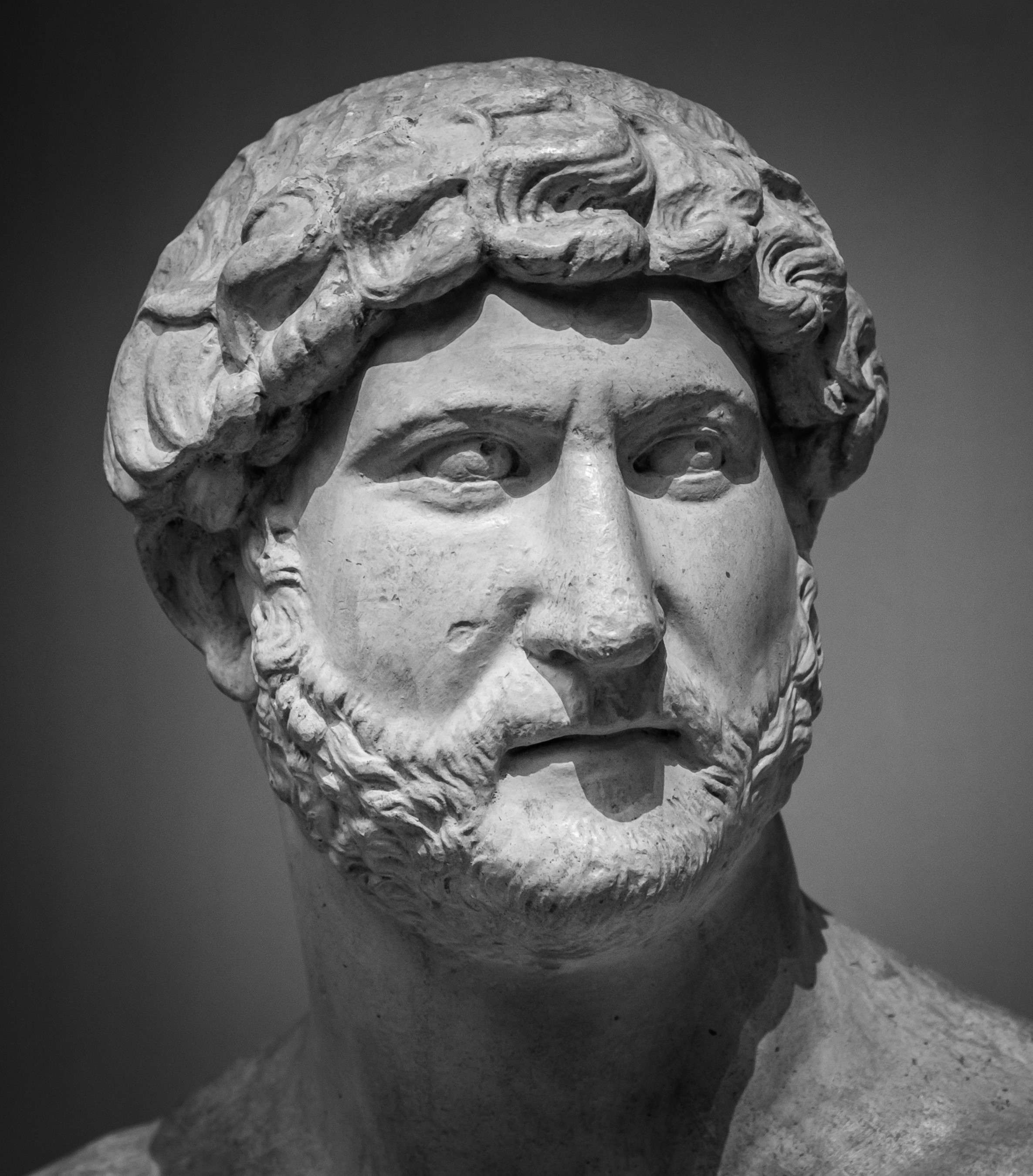 At this time the Roman Emperor Hadrian (see left) insisted on rebuilding the Jewish temple, but it would be dedicated to the Roman-pagan god Jupiter. During the years of 132-135 A.D. a Jew named Bar Kochba, who claimed himself to be the long-awaited Messiah, began another revolt in the land of Palestine. In one year alone the Romans were forced out of more than fifty cities.
At this time the Roman Emperor Hadrian (see left) insisted on rebuilding the Jewish temple, but it would be dedicated to the Roman-pagan god Jupiter. During the years of 132-135 A.D. a Jew named Bar Kochba, who claimed himself to be the long-awaited Messiah, began another revolt in the land of Palestine. In one year alone the Romans were forced out of more than fifty cities.
As a result of this, Julius Severus (the governor of Britain) was brought in by Emperor Hadrian to lead the defense troops and after three years the revolt was destroyed and Bar Kochba was killed. The hatred for the Jews exploded and the Jews were not allowed to enter Jerusalem. Emperor Hadrian outlawed Judaism, circumcision, the study of the Torah (the Law of Moses) and the Biblical Feasts outlined in Leviticus 23, which includes the seventh-day Sabbath!
A Profession Of [the Christian] Faith From The Church Of Constantinople in the year 325 A.D. Under The Emperor Constantine: “I renounce all customs, rites, legalisms, unleavened breads & sacrifices of lambs of the Hebrews, and all other feasts of the Hebrews, sacrifices, prayers, aspersions, purifications, sanctifications and propitiations and fasts, and new moons, and Sabbaths, and superstitions, and hymns and chants and observances and Synagogues, and the food and drink of The Hebrews; in one word, I renounce everything Jewish, every law, rite and custom …” (Cited in: The Conflict Of The Church And The Synagogue, pp. 397-398, by James Parks)
At the same time, Christianity was caught right in the middle of all this, and as a result, some professed Christians began to back off from the Feasts and Sabbaths so they would appear different from the Jews. However, at this time, no one was observing the weekly Sunday as a holy day. In fact, there is evidence that both Saturday and Sunday began to be kept which we will see shortly. The act of the Christians wanting to appear different from anything that seemed Jewish was an early warning sign to the coming change of the Sabbath.
Along with their attempts to “prove” that the Sabbath has been replaced by Sunday, modern teachers also refer to some early writings made by professed Christians during the second and third centuries. They reveal how these writers often used the title “the Lord’s day” in reference to Sunday. These writings fulfill volumes of material and are usually quoted second or third hand, and with this, comes misquotations and mistranslations. Let’s look at some of these quotations.
The Writings of Ignatius
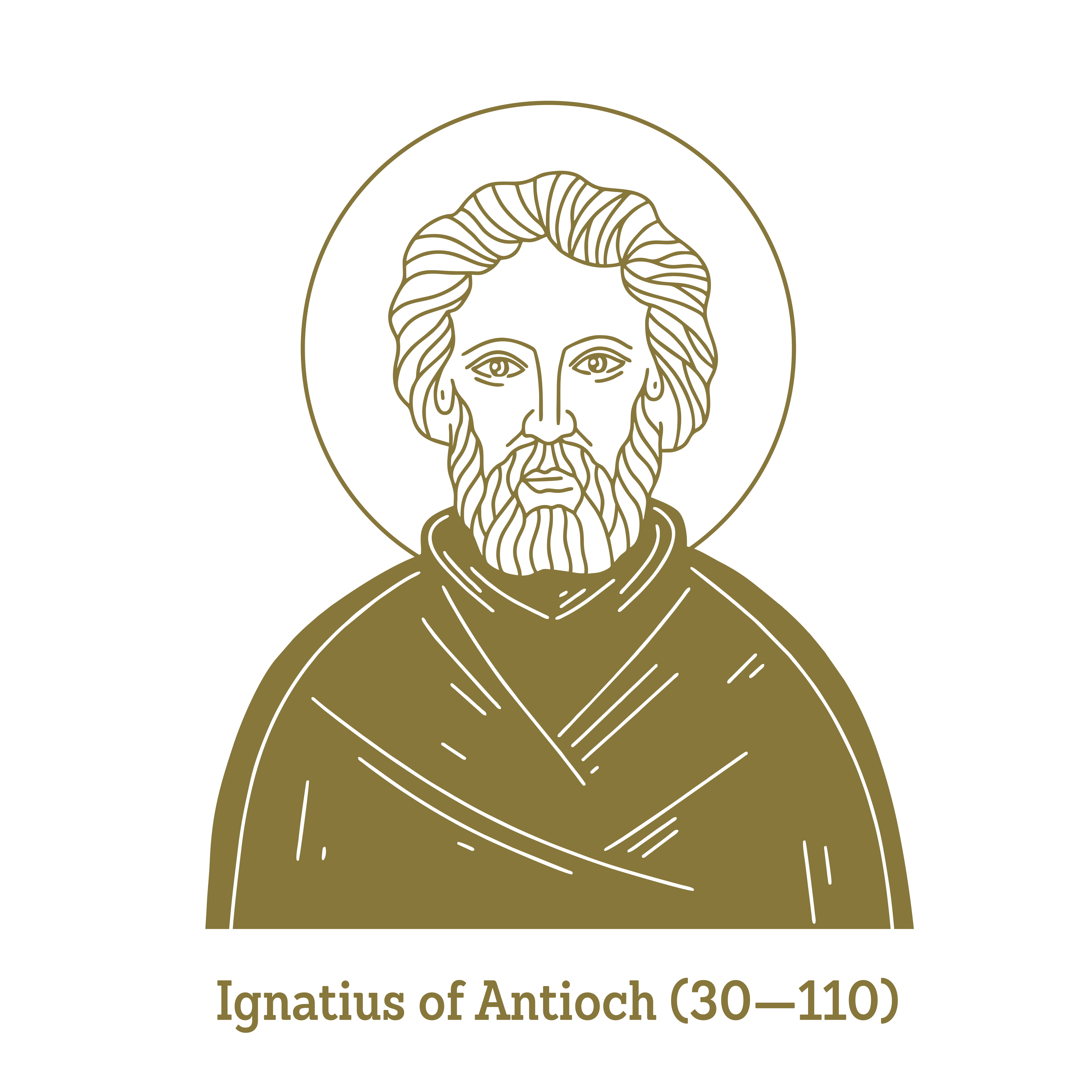 One of the most-often used quotes was made by Ignatius, who lived during the second century A.D., in his Epistle to the Magnesians, 9:1. Here’s how his statement is most-often quoted:
One of the most-often used quotes was made by Ignatius, who lived during the second century A.D., in his Epistle to the Magnesians, 9:1. Here’s how his statement is most-often quoted:
“If then those who had walked in ancient practices attained unto newness of hope, no longer observing sabbaths but fashioning their lives after the Lord's day, on which our life also arose through Him and through His death which some men deny …”
Keep in mind, it has well been established that the writings of Ignatius are mostly misquotations and mere forgeries at best! In his book, History of the Christian Church, Philip Schaff writes that the letters of Ignatius are “so interpolated, curtailed, and mutilated by pious fraud, that it is today almost impossible to discover with certainty the genuine Ignatius of history.” (Vol. 2, p. 660). And, as you will see, this quote concerning “the Lord’s Day” is nothing but “pious fraud.”
Most teachers refer to this quote to prove that the early Christians must have had some awareness of the change of the Sabbath. It is also used as an early reference to the term “Lord’s day” which they say applies to the first day of the week. However, a careful examination of this quote not only shows that Ignatius does not refer to Sunday as the Lord’s Day, but also shows the early Christians’ desire to repel from anything that seemed Jewish.
It is interesting to note that the word Day in the title “Lord’s Day” is not to be found in Ignatius’ original Greek manuscript. In fact, there is no word found after the word “Lord’s” at all! In 1642 a British scholar named Bishop James Ussher, prepared a Latin edition of this quote. In his edition he translated the phrase, “fashioning their lives after the Lord’s [Day],” like this: “Living according to the Lord’s in which also our life sprang up.” There is no word after “Lord’s.” In the English language there is a necessity for a word there. Living according to the Lord’s what? However, this type of phrase is not uncommon in the Latin language. The language permits the omission of a noun following an adjective as long as that noun is used shortly afterwards. So, here’s what we have to work with:
“Living according to the Lord’s [ ? ] in which also our life sprang up.”
There it is. It is the noun “life.” Now the sentence makes perfect sense: “living according to the Lord’s life, in which also our life sprang up.”
In fact, the Jacobson (1838) and Minge (1894) editions of this quote both use the word life instead of day. In 1647 Bishop James Ussher prepared another edition of this which reads, “according to the Lord’s life living.” Thus, we clearly see that Ignatius didn’t even use the term “Lord’s Day.” So, the teaching that this quote is an early reference to the title “Lord’s Day” has no warrant.
But what about the phrase, “If, then, those who walk in ancient practices attain unto newness of hope, no longer observing the Sabbath ...”? Was Ignatius relating the missing text concerning the change of the Sabbath? Some believe so. However, the literal translation of this phrase from the Greek is, “no longer sabbatizing.” It’s hard to tell what Ignatius means by this due to the fact that this word does not appear in any other writings. There is, however, a longer version of the Ignatian letters. This is the understanding of what Ignatius meant:
“Let us therefore no longer keep the Sabbath after the Jewish manner, and rejoice in days of idleness; for ‘he that does not work, let him not eat.’ For say the holy oracles, ‘In the sweat of thy face shalt thou eat thy bread.’ [Genesis 3:19]. But let every one of you keep the Sabbath after a spiritual manner, rejoicing in the workmanship of God, and not eating things prepared the day before, not using lukewarm drinks, and walking within a prescribed space, not finding delight in dancing and plaudits which have no sense in them.”
Even though Ignatius is wrongly mixing up some direct Sabbath instructions from God with added traditions from the religious leaders, it is clear that Ignatius is NOT teaching the replacement of the Sabbath with Sunday, but teaching against observing Sabbaths after the Jewish way of life (manner), and not according to the Lord’s way of life (manner).
We have discussed the great pressure that the hatred between the Jews and the Romans had forced upon Christians leading up to the final decision to ease away from “Jewish” customs. Thus, the word sabbatizing could roughly mean Judaizing. If the Christians could somehow show the Romans that they were not like the Jews, maybe, just maybe, they would ease up on the persecution.
Never, in all of Scripture, is the Sabbath referred to as being “the Jewish Sabbath.” It is called “the Sabbath of the LORD thy God” (Exodus 20:10). Jesus said, “the Sabbath was made for man” (Mark 2:27). The word man here can only mean one thing - mankind! God created the Sabbath on the seventh day of creation week. This would be nearly 2,000 years before a Jew ever existed! Therefore, when people begin to try to separate themselves from anything “Jewish” by not observing the seventh-day Sabbath, they are not separating themselves from the Jews but instead from Jesus—“the Lord of the Sabbath” (Mark 2:28). God, through the prophet Isaiah, says anyone who chooses to observe the Sabbath, joins themselves to “the LORD”, not to Judaism:
“For thus saith the LORD unto the eunuchs that keep My Sabbaths, and choose the things that please Me, and take hold of My covenant; Even unto them will I give in Mine house and within My walls a place and a name better than of sons and of daughters: I will give them an everlasting name, that shall not be cut off. Also the sons of the stranger, that join themselves to the LORD, to serve Him, and to love the name (character) of the LORD, to be His servants, every one that keepeth the Sabbath from polluting it, and taketh hold of My covenant; Even them will I bring to My holy mountain, and make them joyful in My house of prayer: their burnt offerings and their sacrifices (see, 1 Peter 2:5) shall be accepted upon Mine altar; for Mine house shall be called an house of prayer for all people.” (Isaiah 66:4-7)
Also notice in the Ignatian letter above, the author explains that we are to “no longer keep the Sabbath after the Jewish manner.” This statement isn’t doing away with the Sabbath. He says we should “keep the Sabbath after a spiritual manner.” Therefore, instead of having “proof” that the early Christians taught the change of the Sabbath, we actually have evidence that they observed it and desired to observe it the way Jesus did, even though some of their understanding was wrong.
The “Jewish” way of keeping the Sabbath is a yoke of bondage because they have added all sorts of strict rules to the Sabbath, which both God and Jesus disapproved of. (See the article entitled, Does God Hate the Feast Days?).
“God rested not because He was weary [Isaiah 40:28], but because His work was finished. When work is finished, and is well done, nothing but rest remains. In six days God finished His work, and as He surveyed it, He pronounced it ‘very good.’ There was no flaw in it. It was without fault before Him. Therefore since God’s work was well done at the close of the sixth day, ‘He rested on the seventh day from all His work which He had made.’ He had no sad reflections, no regrets … Every portion of the work, even the creation of man and woman, was perfect as it was possible for it to be, and God took pure delight in contemplating the work from which He was resting, because it was complete and perfect. This is the rest He offers to us. IT IS NOT SOMETHING HE IMPOSES ON US, but which He in everlasting love and kindness gives to us. Rest is not a task that is laid on us. It is not a burden. They who look upon the Sabbath as a burden have no idea of what the Sabbath of the Lord is. It is rest, perfect unalloyed rest. Jesus Christ is the One by whom the worlds were made, ‘for in Him were all things created, in the heavens, and upon the earth,’ therefore He is the One who offers us this rest. To every soul He cries, ‘Come unto Me, all ye that labor and are heavy laden, and I will give you rest’ (Matthew 11:28). The rest is found in Him, because in Him the works of God are completed. If the works were our own, then the rest would be our own; but God gives us His rest.” (E.J. Waggoner, The Three Sabbaths)
The Writings of Barnabas
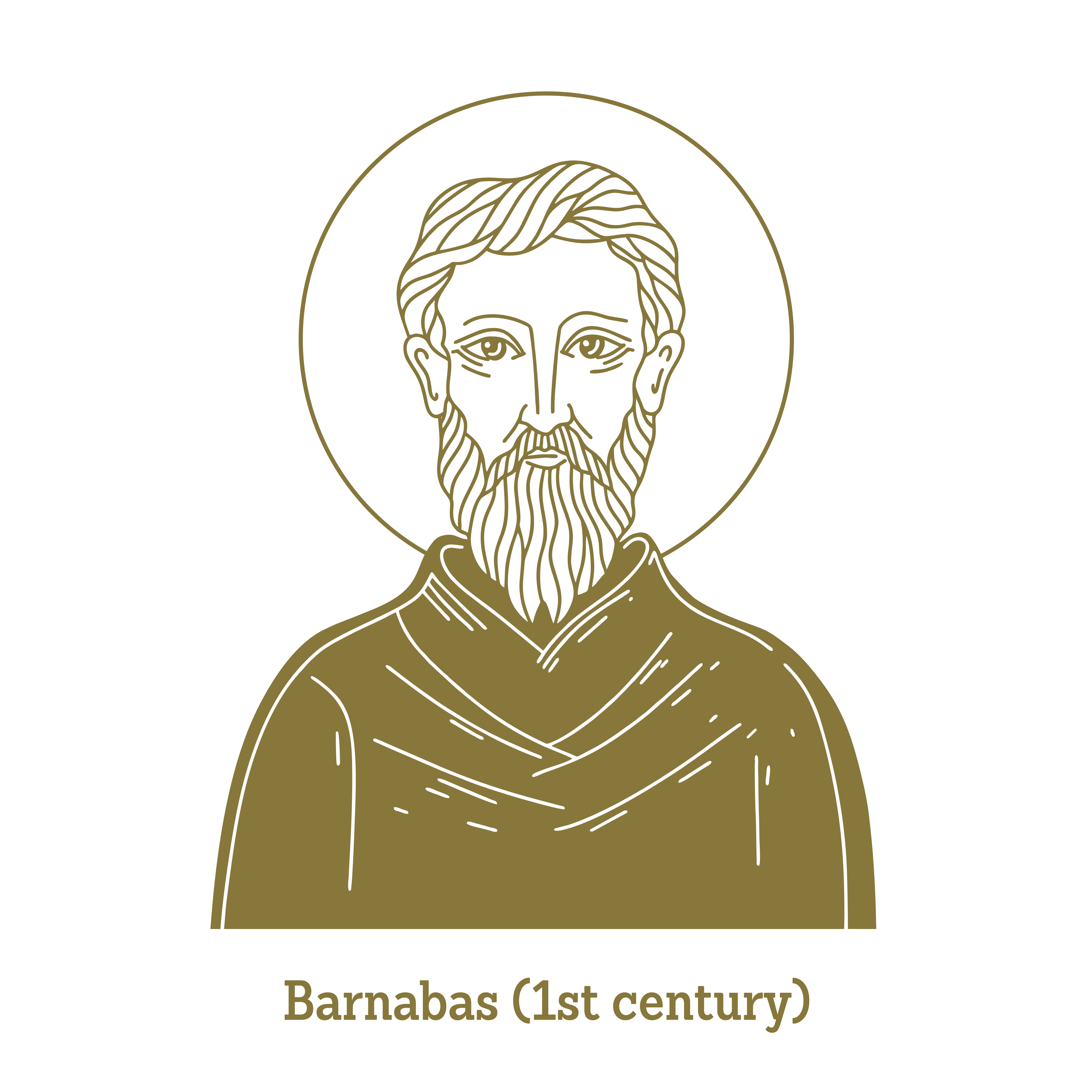 Barnabas from Alexandria is another person whom many erroneously say was the same Barnabas who was Paul’s companion (Acts 13:2). Around the year 130 A.D., Barnabas referred to the seventh-day Sabbath as representing the seventh millennium of earth’s history and thus Sunday represented an “eighth day” meaning a “beginning of another world” – (the eighth millennium). He then adds “Wherefore, also, we keep the eighth day [Sunday] with joyfulness, the day also on which Jesus rose from the dead.” (Epistle of Barnabas, ch. 15 - Ante-Nicene Fathers - Vol. 1. pp. 146,147).
Barnabas from Alexandria is another person whom many erroneously say was the same Barnabas who was Paul’s companion (Acts 13:2). Around the year 130 A.D., Barnabas referred to the seventh-day Sabbath as representing the seventh millennium of earth’s history and thus Sunday represented an “eighth day” meaning a “beginning of another world” – (the eighth millennium). He then adds “Wherefore, also, we keep the eighth day [Sunday] with joyfulness, the day also on which Jesus rose from the dead.” (Epistle of Barnabas, ch. 15 - Ante-Nicene Fathers - Vol. 1. pp. 146,147).
The argument made by Barnabas is that the literal seven days of creation week also have prophetic symbolism. In his full discourse he uses 2 Peter 3:8 as proof which says, “But, beloved, be not ignorant of this one thing, that one day is with the Lord as a thousand years, and a thousand years as one day.” He claims that each day of creation week symbolically represents a full one thousand years. His conclusion is that, in the creation week, God was foretelling us that He would take care of the sin problem in 6,000 years and then the universe will celebrate a one thousand-year-Sabbath during the time of, what is commonly referred to as, “the millennium” outlined in Revelation chapter 20. He then states that the eighth millennium (or, the 8,000th) will begin life anew with the promise that sin will never rear its ugly face again— “… He (God) will make an utter end: affliction shall not rise up the second time” (Nahum 1:9). He also taught that, since the gospel of John refers to Sunday as being “eight days” after resurrection Sunday (John 20:26), then Sunday is a symbol of the coming 8,000th year. However, see my explanation of John 20:26 in the article entitled: Didn’t the Disciples Observe Sunday as the New Sabbath?
To be honest, so far most of his thoughts are somewhat valid. However, his conclusion is, not only wrong, but confusing. First, Barnabas taught that we should no longer keep the weekly seventh-day Sabbath because it looks forward to the 7,000th year of earth’s history which we will celebrate after the second coming of Christ. On the other hand, he taught that, since the 8,000th year represents life anew, never to experience sin again, we ought to observe the weekly Sunday, which he referred to as now being the “eighth day” (one day after the seventh day) in celebration of the resurrection of Christ and the coming 8,000th year. Why the contradiction? Why is it okay to celebrate Sunday as a celebration looking forward to the 8,000th year, but it’s not okay to observe the Sabbath in celebration of the coming 7,000th year?
The truth is, in Scripture, Sunday (the first day of the week) is never spoken of as a day which looks forward or backward to anything. It is never spoken of as a rest day, but as one of “the six working days” (Ezekiel 46:1). On the other hand, according to the Hebrew calendar, God has set up specific days which did and do look forward to prophetic things. Paul clearly said all the Hebrew Festivals, New Moons, and Sabbath days “are a shadow of things to come” (Colossians 2:16-17). The seventh-day Sabbath looks back at Creation, looks present to our complete salvation (our complete re-creation in Christ) and looks forward to that 7,000th year millennial Sabbath “when this corruptible shall have put on incorruption, and this mortal shall have put on immortality” (1 Corinthians 15:54). There is no other day that does this!
The Writings of Justin Martyr
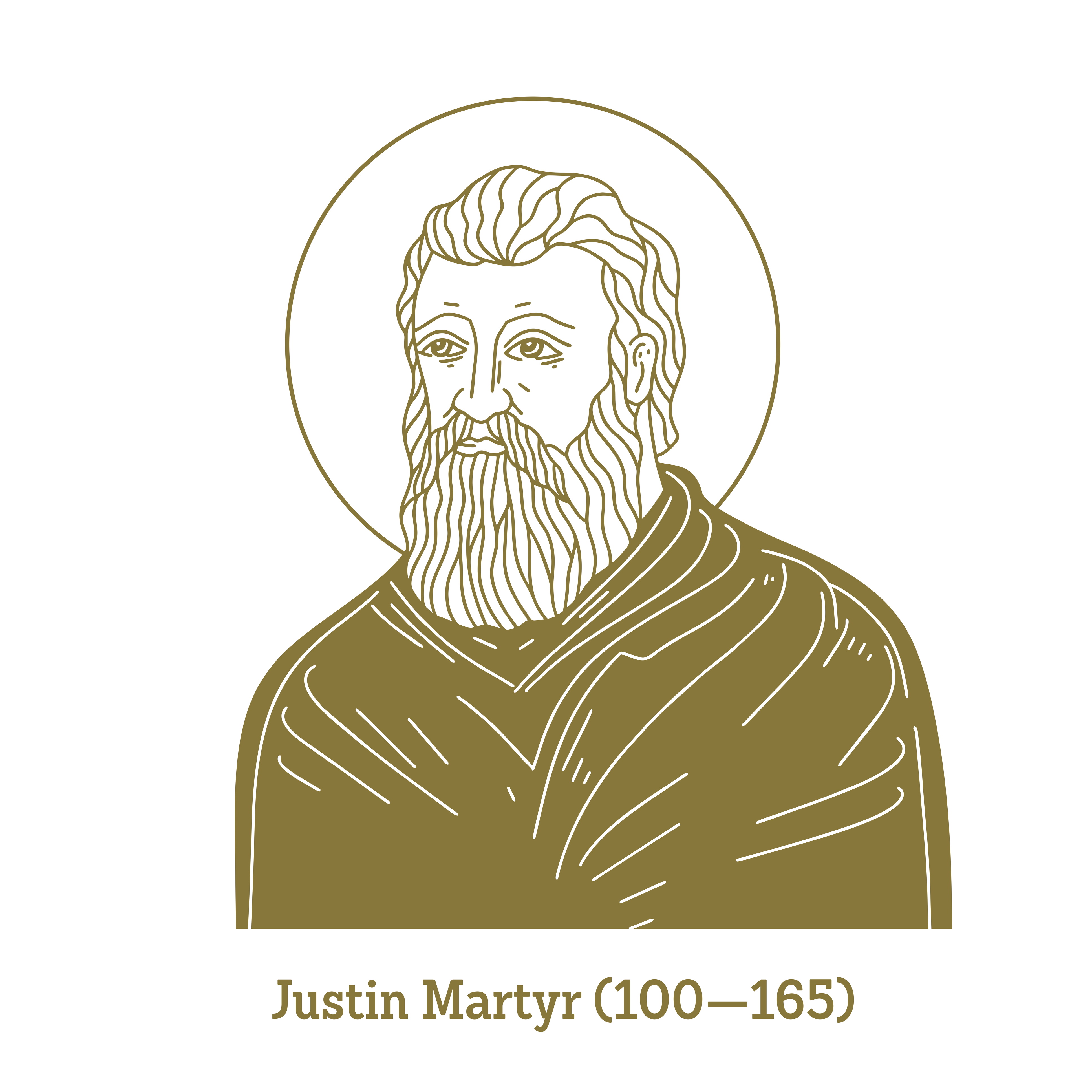 Another famous writer is Justin Martyr from Rome who wrote this around 150 A.D.:
Another famous writer is Justin Martyr from Rome who wrote this around 150 A.D.:
“And on the day called Sunday, all who live in the cities or in the country gather together to one place, and the memoirs of the apostles or the writings of the prophets are read … ” (1 Apology, ch. 67, Ante-Nicene Fathers - Vol. 1, p. 186)
This quote is interesting because it doesn’t even use the term “the Lord’s day” but says “Sunday.” However, after the term “Lord’s Day” was later commonly accepted as Sunday, it was fraudulently written in to replace the word “Sunday” in modern versions. (For example, see D.G. Barnhouse, The Christian and the Sabbath, p. 32).
With that said however, Justin still uses the word “Sunday” on which they held worship services, so let’s take a closer look at this anyway. What was the main purpose of observing Sunday? Later in his Apology Justin wrote:
“Sunday, indeed, is the day on which we hold our common assembly because it is the first day on which God, transforming the darkness and matter, created the world; and our savior Jesus Christ arose from the dead on that same day.”
To these people who lived during the 2nd century, honoring the weekly Sunday would also be honoring Christ’s resurrection. However, nowhere in the Scriptures does God ever give this as a reason to honor another weekly day of public worship and rest in place of the Sabbath. Justin’s alternate reason is because God transformed the darkness into light upon the first day of the week (Genesis 1:1-5). But God has already told us the way to honor and remember that “first day” of creation, and it is by resting upon the seventh as He did.
“Remember the Sabbath day, to keep it holy. Six days shalt thou labour, and do all thy work: But the seventh day is the Sabbath of the LORD thy God: in it thou shalt not do any work, thou, nor thy son, nor thy daughter, thy manservant, nor thy maidservant, nor thy cattle, nor thy stranger that is within thy gates: (WHY?) For in six days the LORD made heaven and earth, the sea, and all that in them is, and rested the seventh day: wherefore the LORD blessed the Sabbath day, and hallowed it.” (Exodus 20:8-11)
It wasn’t until the 2nd-4th centuries A.D. (when Gentile leaders took control) that they began to steer away from anything that seemed “Jewish”, thus rejecting the “light” of the Hebraic roots of the faith, which ushered in what is known as “the Dark Ages” (Isaiah 49:6; 60:3; Luke 2:30-32). Writers such as Ignatius, Barnabas, and Justin Martyr, became known as “early church fathers” thus rejecting the true fathers of the faith such as Abraham, Isaac, and Jacob; with Jesus as “the root” (Isaiah 11; Romans 11).
Justin also stated that God gave the Jews the Sabbath as “a mark to single them out for punishment they so well deserved for their infidelities” (see, Justin Martyr, Dialogue 23,3; 29,3; 16,1; 21,1). This again shows the discrimination toward the Jews. Likewise, the historian Epiphanius mentions the acts of Marcion of Sinope (85-160 A.D., who established his headquarters in Rome in 144 A.D) saying Marcion ordered his followers “to fast on Saturday” justifying it in this way: “Because it is the rest of the God of the Jews … we fast in that day in order not to accomplish on that day what was ordained by the God of the Jews.” (Epiphanius, Adverses haereses 42,3,4).
The condemning of feasting on the Sabbath (making it a day of fasting and gloom) in addition to the discriminatory acts and teachings against the Jews were early signs leading the way to the transformation of Sabbath observance to Sunday observance.
The Writings of Tertullian
When reading the writings of Tertullian we see that these Sunday meetings may have actually started out only being early morning meetings to celebrate the resurrection. The Tertullian writings span from around 145 A.D.-220 A.D. Tertullian wrote that they would meet together “before daybreak” to participate in the “Eucharist” [Catholic version of Communion]. After writing about these early morning Sunday meetings and what takes place during them, Tertullian writes:

“If, for these and other such rules, you insist upon having positive Scripture injunction, you will find none. Tradition will be held forth to you as the originator of them, custom as their strengthener, and faith as their observer. That reason will support tradition, and custom, and faith, you will either yourself perceive, or learn from someone who has.” (The Ante-Nicene Fathers, The Writings of Tertullian, vol. 3, pp. 94, 95)
As we can see, Tertullian claims that tradition was starting to take the place of “positive Scripture.” This was especially true in the cities of Alexandria and Rome. Socrates Scholastics, a church historian of the fifth century A.D. writes this concerning the two cities of Alexandria and Rome:
“For almost all churches throughout the world celebrate the sacred mysteries [the Lord’s Supper] on the sabbath of every week, yet the Christians of Alexandria and at Rome, on account of some ancient tradition, have ceased to do this.” (Socrates Scholasticus, Ecclesiastical History, bk. 5, ch. 22 (The Nicene and Post-Nicene Fathers, 2nd Series, Vol. 2, p. 132)
Keep in mind that this was written in the fifth century and the Sabbath was still observed by Christians throughout the word! However, the two cities of Alexandria and Rome “ceased to do this.” We’ve already quoted from Barnabas of Alexandria and Justin Martyr of Rome to show a couple of reasons why they chose to do this. But pay careful attention to what Socrates wrote above. He wrote that these two cities ceased to observe the Sabbath “on account of some ancient tradition.” Tertullian says they began to have early Sunday morning meetings celebrating “the Eucharist,” not because of any “positive Scripture,” but because of “tradition.” What was this “ancient tradition” that these two pagan cities were observing? Could it be the ancient practice of sun-worship? There is plenty of evidence to support this view:
“[The name] Sunday is the first day of the week, adopted from the Roman calendar because it was dedicated to the worship of the sun.” (Unger’s Bible Dictionary, Article: “Sunday”)
“Sunday was a name given by the heathens to the first day of the week, because it was the day they worshipped the sun.” (Eadie’s Biblical Cyclopedia, 1872, p. 561)
The Third Century A.D.
In the book, General History of the Christian Religion and Church (p. 186), Johann Neander writes:
“Opposition to Judaism introduced the particular festival of Sunday very early, indeed, into the place of the Sabbath ... The festival of Sunday, like all other festivals, was always only a human ordinance, and it was far from the intentions of the apostles to establish a divine command in this respect, far from them, and from the early apostolic church, to transfer the laws of the Sabbath to Sunday. Perhaps, at the end of the second century a false application of this kind had begun to take place; for men appear by that time to have considered laboring on Sunday as a sin.”
In the late second century A.D. a controversy broke out between the churches of Asia Minor and the leaders of the church of Rome on when to observe Passover. This controversy was called the Quartodeciman Controversy which still exists to this day. The Christians of Asia Minor argued that Passover should be kept according to Scripture upon the 14th day of the first Hebrew month called Abib (Aviv) also known as Nisan (Leviticus 23:5), a day that the church of Rome rejected due to their hatred of the Jews:
"The interesting thing about keeping Passover on the 14th of Abib made it always a Full Moon, and that it could land on any day of the week. This annoyed the policy makers of the Roman Empire, who didn’t like having to get the date from the Jews (whom they disliked), nor having to wait for the new moon sighting and the checking of Abib (which I believe was still being done, the Hillel Calendar was not used until 300 AD). They wanted a fixed date, like their Pagan holidays, that they could declare to the whole Empire, and they wanted it on Sunday to coincide with their plans to sanctify Sunday as the new holy day of Christianity. Centering the feast around Sunday (which is actually when first fruits is, which could be any number of days separated from the starting date of Passover - See Leviticus 28) would sanctify the day and make it easier to accept as the weekly feast. It would distinguish the religion from Judaism more distinctly. Thus they would introduce the Thursday-Sunday format we have today (Holy Thursday, Good Friday, Black Saturday, Easter – which over the centuries extended to be “Holy Week" from the original “Paschal Triduum").
A lot of the history of the early church is shrouded in mystery, but this new format quickly spread in popularity, probably due to its convenience, its fitting the Julian Calendar, and its being sponsored by the State. As the religion grew, this dispute over the timing of Passover became more noticeable, and by 200AD it had become a big deal (at least to the Pope of Rome), and the historian Eusebius (writing in the 300s under Constantine) recounts that Pope Victor I wanted to excommunicated the churches who kept Passover on the 14th of Abib, and sent letters all over the world saying he had done so ... The churches excommunicated in the Quartodeciman Controversy were ancient churches of what is now Eastern Turkey, including all the seven churches of Revelation 2-3. These churches were united in keeping it according to what they believed had been passed down to them from the disciples." (Danutasn Brown, The Apostolic Church Argued Over WHEN to Keep Passover— Quartodeciman Controversy)
As the above comment stated, the historian Eusebius (in his Ecclesiastical History, Volume 5. pp. 23-25) writes of this controversy. Eusebius states that in 195 A.D. Polycrates mentions that he observes Passover upon the correct biblical date (Abib 14), not according to Judaism, but “according to the gospel.” Not according to a self-works-based religion, but “following according to the rule of faith.” He also mentions that the disciples Philip and John did the same:
“Therefore we keep the day [of Passover] undeviatingly, neither adding nor taking away, for in Asia [Minor] great luminaries sleep, and they will rise on the day of the coming of the Lord, when he shall come with glory from heaven and seek out all the saints. Such were Phillip… and two of his daughters… There is also John who lay on the Lord’s breast… And there is also Polycarp at Smyrna, both bishop and martyr, and Thraseas, both bishop and martyr, from Eumenaea…[Also] Sagaris,… Papirius, … and Melito … all of these kept the fourteenth day of the Passover according to the gospel, never swerving, but following according to the rule of the faith … Therefore, brethren, I who have lived sixty-five years in the Lord and conversed with brethren from every country, and have studied all holy Scripture am not afraid of threats, for they have said, who were greater than I, ‘It is better to obey God rather than men.’” (Eusebius. Church History, Volume V, Chapter 24; Nicene and Post-Nicene Fathers, Series Two, Volume 1)
Keep in mind that this controversy concerned when to observe Passover, not if it should be observed. This is clear confirmation that Christians still observed Passover after the death and resurrection of Jesus. Otherwise, there would not have been any controversy of when to observe it.
“From Rome there came now another addition to the sun-worshiping apostasy. The first Christians being mostly Jews, continued to celebrate the Passover in remembrance of the death of Christ, the true Passover; and this was continued among those who from among the Gentiles had turned to Christ. Accordingly, the celebration was always on the true Passover day—the fourteenth of the first month. Rome, however, and from her all the West, adopted the day of the sun as the day of this celebration … The rule of Rome was that the celebration [of Easter] must always be on a Sunday—the Sunday nearest to the fourteenth day of the first month of the Jewish year [Abib/Nisan]. And if the fourteenth day of that month should fall on Sunday, then the celebration was not to be held on that day, but upon the next Sunday.” (A.T. Jones, Great Empires of Prophecy, pp. 213-214)
As the influence from the Church of Rome expanded, and their determination to be unlike the Jews, the Church of Rome adopted another pagan tradition which stems from the celebration of Ishtar. This tradition is commonly called “Lent.” Lent is the forty-day period in which some professed Christians get ready for Easter. During these forty days prior to Easter Sunday there is a period of prayer, fasting from certain foods, and causing affliction to ones’ body.
In Humbolt’s Mexican Researches, Vol. 1, page 404 we read of pagan Mexicans who observed this forty-day period. He writes: “Three days after the vernal equinox began a solemn fast of forty days in honor of the sun.” Here we see that Rome had adopted the pagan practice of calculating the head of the year by the vernal equinox, instead of the biblical way of sighting the sliver of the new moon and the checking of Abib barley in Jerusalem. This pagan method of calculating Easter from the first full moon after the venal equinox was in keeping with the spring festival in honor of Ishtar—the goddess of fertility—celebrated with eggs and rabbits.
“Seest thou not what they do in the cities of Judah and in the streets of Jerusalem? The children gather wood, and the fathers kindle the fire, and the women knead their dough, to make cakes (hot cross buns) to the queen of heaven (Ishtar/Easter), and to pour out drink offerings unto other gods, that they may provoke Me to anger.” (Jeremiah 7:17, 18)
These celebrations were adopted during the third century A.D. It was determined that, not only would Sunday be an annual celebration, but also a weekly celebration during those forty days of Lent. Thus, Sunday observance, as a weekly celebration, was gaining even more favor among the churches in Alexandria and Rome. Therefore, the “ancient tradition” that Socrates Scholasticus referred to in the fifth century must have been sun-worship.
“Legend has it that [the sun-god] Tammuz (see left) was killed by a wild boar when he was forty years old. [Alexander] Hislop points out that forty days -- a day for each year Tammuz had lived on earth -- were set aside to ‘weep for Tammuz.’ In olden times these forty days were observed with weeping, fasting, and self-chastisement -- to gain anew his favor -- so he would come forth from the underworld and cause spring to begin. This observance was known not only at Babylon, but also among the Phoenicians, Egyptians, Mexicans, and, for a time, even among the Israelites.” (Ralph Edward Woodrow, Babylon Mystery Religion, p. 139).
“Among the Pagans this Lent seems to have been an indispensible preliminary to the great annual festival in commemoration of the death and resurrection of Tammuz, which was celebrated by alternate weeping and rejoicing, and which, in many countries, was considerably later than the Christian festival, being observed in Palestine and Assyria in June, therefore called the ‘month of Tammuz;’ in Egypt, about the middle of May, and in Britain, sometime in April. To conciliate the Pagans to nominal Christianity, Rome, pursuing its usual policy, took measures to get the Christian and Pagan festivals amalgamated, and, by a complicated but skillful adjustment of the calendar, it was found no difficult matter, in general, to get Paganism and Christianity - now far sunk in idolatry - in this as in so many other things, to shake hands.” (Alexander Hislop, The Two Babylons, second American edition, 1959, pp. 106, 107)
The Bible foretold this would happen:
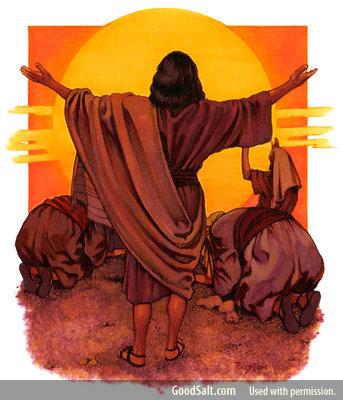 “Then He (God) brought me (Ezekiel) to the door of the gate of the LORD'S house which was toward the north; and, behold, there sat women weeping for Tammuz. Then said He unto me, Hast thou seen this, O son of man? turn thee yet again, and thou shalt see greater abominations than these. And He brought me into the inner court of the LORD'S house, and, behold, at the door of the temple of the LORD, between the porch and the altar, were about five and twenty men, with their backs toward the temple of the LORD, and their faces toward the east; and they worshipped the sun toward the east.” (Ezekiel 8:14-16)
“Then He (God) brought me (Ezekiel) to the door of the gate of the LORD'S house which was toward the north; and, behold, there sat women weeping for Tammuz. Then said He unto me, Hast thou seen this, O son of man? turn thee yet again, and thou shalt see greater abominations than these. And He brought me into the inner court of the LORD'S house, and, behold, at the door of the temple of the LORD, between the porch and the altar, were about five and twenty men, with their backs toward the temple of the LORD, and their faces toward the east; and they worshipped the sun toward the east.” (Ezekiel 8:14-16)
Around 277 A.D. Archelaus, a bishop of Cascar in Mesopotamia, writes:
“Again, as to the assertion that the Sabbath has been abolished, we deny that He [Jesus] abolished it plainly; for He was Himself also Lord of the Sabbath.” (The Ante-Nicene Fathers, vol. 6, p. 217)
In the Apostolic Constitutions, which dates and authors are unknown, but were compiled in the fourth century, we read that the early Christians would “keep the Sabbath [meaning Saturday], and the Lord’s day [meaning Sunday]; because the former is the memorial of the creation, and the latter of the resurrection ... Let the slaves work five days; but on the Sabbath-day and the Lord’s day let them have leisure to go to church for instruction in piety.” (The Ante-Nicene Fathers, Vol. 7, pp. 469, 495).
In fact, this is how we got our two-day weekend of Saturday and Sunday. We can also see that some professed Christians observed both Sabbath and Sunday. Although there is nothing wrong with holding an assembly on any day of the week, the act of replacing “the Sabbath of the LORD thy God” with another day, “on account of some ancient tradition,” is not according to Scripture. Remember, Jesus plainly said, “Thus have ye made the commandment of God of none effect by your tradition” (Matthew 15:6). In the Apostolic Constitutions we also read:
“Thou shalt observe the Sabbath, on account of Him who ceased from His work of creation, but ceased not from His work of providence: it is a rest for meditation of the law, not for idleness of the hands” (The Ante-Nicene Fathers, Vol.7, p. 413)
Notice the observance of the Sabbath is “on account of Him who ceased from His work of creation”, while Sunday observance is “on account of some ancient tradition.” Although the Apostolic Constitutions also refer to assembling on “the Lord’s day” (referring to Sunday), we also read this: “But assemble yourselves every day, morning and evening, … but principally on the Sabbath” (The Ante-Nicene Fathers, Vol. 7, p. 413).
2nd Century A.D.: “The primitive Christians did keep the Sabbath of the Jews;...therefore the Christians, for a long time together, did keep their conventions upon the Sabbath, in which some portions of the law were read ...” (The Whole Works of Jeremy Taylor, Vol. IX, p. 416 (R. Heber's Edition, Vol. XII, p. 416)
3rd Century A.D.: “After the festival of the unceasing sacrifice (the crucifixion) is put the second festival of the Sabbath, and it is fitting for whoever is righteous among the saints to keep also the festival of the Sabbath. There remaineth therefore a sabbatismus, that is, a keeping of the Sabbath, to the people of God (Hebrews 4:9).” (Homily on Numbers 23, par.4, in Migne, Patrologia Graeca,” Vol. 12,cols. 749, 750)
The Fourth Century A.D.
“The ancient Christians were very careful in the observance of Saturday, or the seventh day … It is plain that all the Oriental churches, and the greatest part of the world, observed the Sabbath as a festival … Athanasius likewise tells us that they held religious assembles on the Sabbath, not because they were infected with Judaism, but to worship Jesus, the Lord of the Sabbath, Epiphanius says the same.” (Antiquities of the Christian Church, Vol.II Book XX, chap. 3, sec.1, 66. 1137,1138)
 When the pagan-Roman Emperor Constantine (see left) took the seat of authority, he claimed he had a dream of a cross and because of this cross he was converted to Christianity. Not only did Constantine stop the persecutions by legalizing Christianity, but he also compromised the teachings of Christianity with paganism. This time period is known as the “Era of Compromise.”
When the pagan-Roman Emperor Constantine (see left) took the seat of authority, he claimed he had a dream of a cross and because of this cross he was converted to Christianity. Not only did Constantine stop the persecutions by legalizing Christianity, but he also compromised the teachings of Christianity with paganism. This time period is known as the “Era of Compromise.”
In order to attract the pagans into the Christian church, Constantine mingled truth with error. Not only did Constantine mix pagan doctrines with Christianity but it was he who first made Sunday observance a law! In 321 A.D. Constantine signed this first Sunday Blue Law which ordered Sunday rest instead of Sabbath rest:
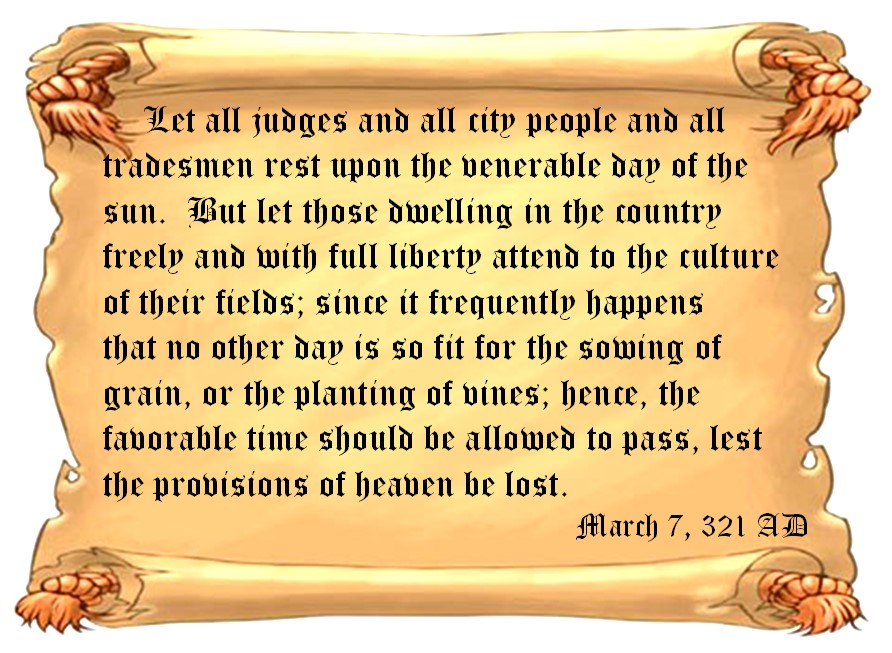
Notice that Constantine’s Sunday Law is geared towards his fellow pagans. He uses the phrase “venerable day of the sun.” To venerate something means to “regard with reverence.” Therefore, something which is venerable means to be “worthy of veneration.” Thus, Constantine enforced the ancient practice of sun-worship to the early Christians by making it a law.
“They despise our sun-god. Did not Zorcaster [priest of Mithraism], the sainted founder of our divine beliefs, institute Sunday one thousand years ago in honour of the sun and supplant the Sabbath of the Old Testament? Yet these Christians have divine services on Saturday.” (Persia 335-375. 40 yr. persecution under Shapur II, quoted from O'Leary, The Syriac Church and Fathers, pp. 83, 84)
As time went on, church leaders began to organize Sunday observance. Although the Sabbath was not yet fully replaced by Sunday, many councils were being held to do just that. One main council was held in Laodicea in 364 A.D. when the following stipulation was written in their law books (Canon 29):
“Christians shall not Judaize and be idle on Saturday but shall work on that day; but the Lord’s day [meaning Sunday] they shall especially honour, and, as being Christians, shall, if possible, do no work on that day. If, however, they are found Judaizing [keeping the Sabbath], they shall be shut out from Christ.” (Charles J. Hefele. A History of the Councils of the Church, trans. Henry N. Oxenham, Vol. 2 [Edinburgh, 1896], p. 316)
The Roman church had to enforce these laws in order to quench the observance of the Sabbath because, even at this time, Sabbath keeping was still popular by those who were faithful to remember their Creator.
“From the apostles’ time until the council of Laodicea, which was about the year 364, the holy observance of the Jews’ Sabbath [meaning, seventh-day Sabbath] continued, as may be proved out of many authors: yea, notwithstanding the decree of the council against it.” (John Ley, Sunday a Sabbath, p.163. London: 1640; words in brackets my own)
“The seventh-day Sabbath was … solemnised [observed/celebrated] by Christ, the Apostles, and primitive Christians, till the Laodicean Council did in manner quite abolish the observations of it.” (Dissertation on the Lord’s Day, pp. 33, 34)
“Ambrose, the celebrated bishop of Milan, said that when he was in Milan he observed Saturday, but when in Rome observed Sunday. This gave rise to the proverb, ‘When you are in Rome, do as Rome does.’” (Heylyn, The History of the Sabbath, 1612)
In 386 A.D. Theodosius I and Gratian Valentinian added more restrictions to Sunday observance to the point that litigation should cease on that day and there would be no private or public payment of debt (see the Theodosian Code, 11.7.13, trans. by Clyde Pharr [Princeton N.J., 1952], p. 300).
The Fifth Century Through the Eighth Century A.D.
“There are several cities and villages in Egypt where, contrary to the usage established elsewhere, the people meet together on Sabbath evenings, and, although they have dined previously, partake of the mysteries.” (Sozomen. Ecclesiastical History, Book 7, ch. 119)
“… we find traces in the early monastic church of Ireland by which they held Saturday to be the Sabbath on which they rested from all their labours.” (W.T. Skene, Adamnan’s Life of St. Columba, p. 96)
In A.D. 425 Theodosius II extended the restrictions again to prohibit the circus, theater, and horse racing on Sunday. On page 261 in his book, Paganism to Christianity, Walter W. Hyde gives us a summary of several centuries concerning the change of the Sabbath after Constantine:
“The emperors after Constantine made Sunday observance more stringent but in no case was their legislation based on the Old Testament ... At the Third Synod of Aureliani (Orleans) in 538 rural work was forbidden but the restriction against preparing meals and similar work on Sunday was regarded as a superstition. After Justinian’s death in 565 various epistolae decretales were passed by the popes about Sunday. One of Gregory I (590-604) forbade men ‘to yoke oxen or to perform any other work, except for approved reasons,’ while another of Gregory II (715-731) said: ‘We decree that all Sundays be observed from vespers to vespers and that all unlawful work be abstained from.’ ... Charlemagne at Aquisgranum (Aachen) in 788 decreed that all ordinary labor on the Lord’s Day be forbidden, since it was against the Fourth Commandment, especially labor in the field or vineyard which Constantine had exempted.”
Are you beginning to fully see how Satan has swept this deception under the doors of the church? Notice the above quote says Charlemagne “decreed that all ordinary labor on the Lord’s Day be forbidden, since it was against the Fourth Commandment.” What we see here is a direct attempted change to the commandments of God. In the Fourth Commandment God speaks of “the seventh day”, while the Roman church says the Fourth Commandment refers to “the first day”, calling it “The Lord’s Day.” This answers the prophecy of the “little horn” power which would rise from Rome:
 “Thus he said, The fourth beast shall be the fourth kingdom upon earth (Rome), which shall be diverse from all kingdoms, and shall devour the whole earth, and shall tread it down, and break it in pieces. And the ten horns out of this kingdom are ten kings that shall arise: and another shall rise after them; and he shall be diverse from the first, and he shall subdue three kings. And he shall speak great words against the most High, and shall wear out the saints of the most High, and think to change times and laws: and they shall be given into his hand until a time and times and the dividing of time.” (Daniel 7:23-25)
“Thus he said, The fourth beast shall be the fourth kingdom upon earth (Rome), which shall be diverse from all kingdoms, and shall devour the whole earth, and shall tread it down, and break it in pieces. And the ten horns out of this kingdom are ten kings that shall arise: and another shall rise after them; and he shall be diverse from the first, and he shall subdue three kings. And he shall speak great words against the most High, and shall wear out the saints of the most High, and think to change times and laws: and they shall be given into his hand until a time and times and the dividing of time.” (Daniel 7:23-25)
Notice verse 25 again as it reads in the New Living Translation:
"He will defy the Most High and oppress the holy people of the Most High. He will try to change their sacred festivals and laws, and they will be placed under his control for a time, times, and half a time." 1
This change wasn’t made overnight. Satan had to bring in this deception little by little so no one would notice what’s really going on. One author puts it this way:
“Bear in mind that the substitution [of the first for the seventh day] was not a coerced happening; it could not be a sudden, but only a very slow development, probably never anticipated, never even designed or put into shape by those chiefly interested, but creeping almost unconsciously into being.” (William B. Dana, A Day of Rest and Worship, p. 689)
And another well-known author puts it this way:
“You will hear men say with all confidence that, while the seventh day was kept to the crucifixion, the practice of the church since then has been unanimous in keeping the first day. I do not see how a man can be honest and say this, unless he is very ignorant, as the most trustworthy historians ... testify to the contrary … When it [Sunday] was introduced, it did not come in as a sabbath. Look at the word itself, ‘Sunday.’ Webster defines it as ‘so-called, because this day was anciently dedicated to the sun;’ and the North British Review styles it ‘the wild solar holiday of all pagan times.’ Now, how did it creep into the church? I’ll tell you how. When the early Christians evangelized the heathen tribes, they would go to the head, or chief, and labor with him ... to be baptized. They were pagans, and had kept Sunday as a festival in honor of one of their gods, the sun; and when they outwardly accepted Christianity, they kept up their observance of Sunday, which gradually supplanted the Lord’s Sabbath … The observance of Sunday, introduced as a holiday, or festival, gradually assumed more importance as a rival of God’s Sabbath, until, by the influx of half-converted pagans into the church, bringing with them their solar holiday, it began to supplant its divinely appointed rival.” (D.M. Canwright, Tabernacle Lectures, pp. 76-83)
1 For more info concerning this "little horn" power who would "try to change their sacred festivals and laws", refer to the Questions Concerning Bible Prophecy section.

